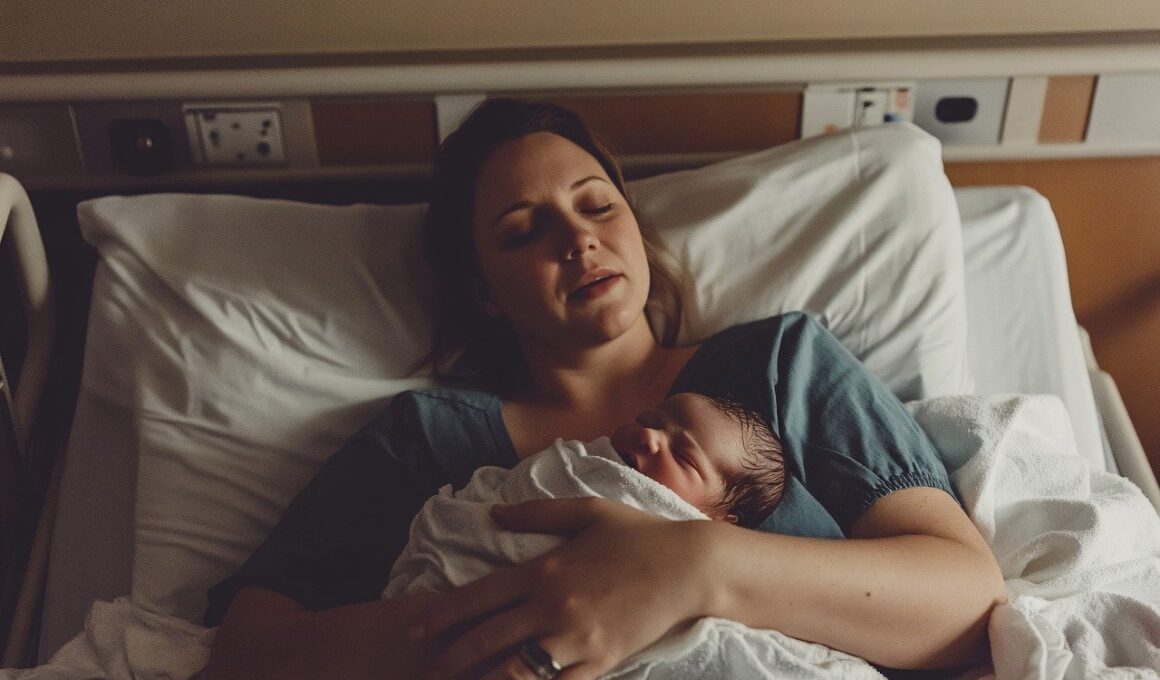The Psychological Impact of Sleep Loss on Postpartum Exercise Motivation
Sleep loss can severely impact psychological health, particularly in new mothers. After giving birth, many women experience interrupted sleep due to their babies’ feeding and care needs. This lack of restorative sleep may lead to feelings of fatigue and irritability, which can diminish the motivation to exercise. Research indicates that insufficient sleep alters mood and cognitive functions, making it harder to engage in physical activities. Moreover, the emotional toll of sleep deprivation can result in increased anxiety or depression, further hindering motivation. Consequently, mothers may feel overwhelmed, consequently prioritizing rest over fitness routines. The interplay between sleep and mental health highlights the need for adequate rest postpartum, creating a foundation for a healthier lifestyle. Apart from direct psychological effects, sleep loss can also affect physical health. Decreased energy levels may lead to reduced physical activity, making it difficult for mothers to meet their fitness goals. As postpartum mothers acknowledge the correlation between sleep and exercise motivation, creating support systems that promote better sleep hygiene may empower them in their fitness journeys. Understanding these dynamics is crucial for effective postpartum fitness strategies.
In addition to impacting motivation, sleep deprivation can exacerbate postpartum physical recovery after childbirth. The postpartum period can be a physically demanding time as a new mother experiences significant changes in her body. Adequate sleep plays a vital role in the body’s healing processes. Without sufficient rest, the body’s ability to repair and recover may be compromised. This can result in prolonged feelings of stiffness and soreness, ultimately discouraging physical activity. Consequently, the cycle of sleep loss and lack of exercise may contribute to feelings of frustration and helplessness. New mothers may feel trapped in a struggle between caring for their newborns and their personal health goals. Realizing the importance of sleep during recovery can empower mothers to prioritize it without guilt. Techniques such as creating a designated sleep schedule or taking short naps can be beneficial. Incorporating relaxation practices before bed can also help new mothers enter a deeper sleep cycle. Additionally, sharing night care responsibilities with partners can allow mothers to receive more restorative sleep, which is essential for maintaining motivation for fitness activities. A well-rested mind and body can significantly enhance the desire to engage in exercise.
Social Support and Exercise
Social support plays a critical role in helping postpartum mothers engage in fitness activities amidst sleep deprivation challenges. Emotional support from partners, friends, and family members can be the key to overcoming obstacles posed by sleep loss. Joining a community or fitness group with other new mothers fosters an encouraging environment and promotes accountability. When mothers feel supported, they are more likely to prioritize their exercise routines. Furthermore, sharing experiences and tips on managing sleep can transform the collective understanding of postpartum fitness hurdles. This communal aspect may lead to sustained motivation, as mothers inspire one another to achieve their individual goals. Additionally, group exercises, such as Mom and Baby fitness classes, allow mothers to bond with their infants while simultaneously prioritizing physical activity. Such classes often focus on gentle yet effective workouts that are specifically designed for postpartum recovery. New mothers become less burdened by feelings of isolation, knowing they share similar experiences with others. This supportive camaraderie enhances the overall experience of motherhood. As a result, overcoming sleep and fitness challenges collectively can create a sustainable approach towards a healthier lifestyle.
The psychological impact of sleep loss extends to self-esteem and body image for postpartum mothers. After childbirth, many women experience a shift in their physical appearance, leading to complex feelings regarding their bodies. With fatigue stemming from sleep deprivation, negative self-talk may become more frequent, impacting confidence levels. Engaging in fitness can be a way to improve self-image and mental health; however, when exhaustion prevails, motivation wanes. Mothers may avoid exercising due to feeling unattractive or unmotivated, creating an unhealthy cycle where low self-esteem begets inactivity. To combat this, setting small, achievable fitness goals can help mothers gradually regain confidence. Celebrating progress within a supportive community can also foster a positive mindset. Furthermore, incorporating enjoyable activities rather than strict workout routines is essential. When physical activity is perceived as a fun, stress-relieving outlet, motivation may increase, helping mothers break free from negative thought patterns. Lastly, emphasizing body positivity can shift focus from appearance to what the body can accomplish. Embracing the postpartum body can greatly enhance mental well-being and lead to more sustained exercise motivation.
Wellness Strategies for Better Sleep
Implementing wellness strategies can significantly improve sleep quality and, consequently, exercise motivation. Simple practices such as creating a calming bedtime routine and establishing a consistent sleep schedule can make a difference. Practicing relaxation techniques, such as deep breathing or gentle stretching, can help ease the transition into sleep. Additionally, cultivating a sleep-friendly environment—cool, dark, and quiet—can promote better slumber by reducing disturbances. Avoiding screens and stimulating activities before bedtime also tends to enhance sleep quality. Diet plays a critical role; thus, consuming a balanced diet with sleep-promoting foods like nuts and cherry juice may be beneficial. Staying hydrated throughout the day while avoiding excessive caffeine and sugar can also contribute to better sleep patterns. Also, prioritizing self-care during the day is crucial for managing postpartum stressors. Rather than pushing aside personal needs, finding moments for self-compassion can positively influence motivation. Encourage new mothers to seek help from partner or family members while ensuring they have pockets of time for themselves. These wellness strategies are essential not only for promoting better sleep but also for enhancing postpartum exercise motivation.
Sleep hygiene must be prioritized for postpartum mothers navigating their fitness recovery. Many new moms overlook the importance of creating a restful environment conducive to sleep. This includes ensuring the bedroom is a peaceful sanctuary, devoid of distractions, such as electronic devices. Additionally, using blackout curtains and white noise machines can effectively enhance sleep quality. Another helpful strategy is adjusting the timing of evening routines; limiting stimulating activities before sleep can promote relaxation. Following a consistent daily routine for both caring for the baby and for fitness can also create predictability, which can help mothers unwind. Moreover, integrating mindfulness practices into daily life can empower mothers to develop healthy coping mechanisms for dealing with stress. Simple practices like meditation or gratitude journaling can raise awareness of their mental health and foster resilience. By focusing on sleep hygiene, mothers give their minds the chance to recuperate fully, leading to sustainable fitness motivation. As sleep quality improves, the overall physical and emotional well-being benefits. Consequently, when mothers feel rested and refreshed, they are more likely to have the energy to engage in regular exercise, ultimately promoting a healthier postpartum lifestyle.
The Way Forward
Developing a comprehensive understanding of the psychological impacts of sleep loss on fitness motivation among postpartum mothers is crucial. Through targeted strategies to improve sleep quality, create social support networks, and prioritize self-compassion, mothers can significantly enhance their overall well-being. Addressing these interconnected aspects presents an opportunity to foster healthy habits that support postpartum recovery. Emphasizing that sleep and exercise are not just improvements to physical health but integral to a mother’s emotional and mental well-being can shift the narrative surrounding postpartum fitness. Furthermore, engaging stakeholders in maternal health, including healthcare providers, is vital in establishing supportive systems. These systems can aid mothers in developing effective routines that accommodate their unique experiences. Continuous education around postpartum mental health can sensitize society to the challenges faced by new mothers, creating a more empathetic environment. De-stigmatizing the struggles of postpartum living fosters a supportive community where women feel empowered to seek help and resources. Ultimately, the journey to motivating exercise in the postpartum period must encompass a holistic approach that prioritizes sleep, mental health, and community support.


